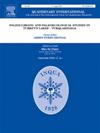华北泥河湾盆地早更新世猛犸象-鼯鼠动物群的前身
IF 1.9
3区 地球科学
Q3 GEOGRAPHY, PHYSICAL
引用次数: 0
摘要
典型的Mammuthus-Coelodonta动物群在中晚更新世统治了欧亚大陆的中高纬度地区,主要类群包括长毛猛犸象(Mammuthus primigenius)、长毛犀牛(Coelodonta antiquitatis)、草原野牛(Bison priscus)和多种马(Equus spp.)等。最近在华北尼河湾盆地早更新世遗址山神庙嘴的发掘,发现了丰富的哺乳动物化石,包括草原猛犸象(Mammuthus trogontherii)、尼河湾毛犀(Coelodonta nihowanensis)、古中国野牛(Bison (Eobison) palaeosinensis)和丰富的早期马化石。尼河湾盆地的几个遗址(下沙沟、山神庙嘴和叶牛坡)出土了马氏-侏罗纪-野牛化石群,可视为马氏-侏罗纪动物群的近祖或晚期马氏-侏罗纪动物群的先驱。尼河湾盆地拥有迄今为止最丰富、最完整的早更新世浣熊和野牛化石,而 M. trogontherii 的幼年标本也代表了同类和同地质年代最丰富的收藏。本文章由计算机程序翻译,如有差异,请以英文原文为准。
Early Pleistocene forerunners of Mammuthus-Coelodonta Faunal Complex in Nihewan Basin, North China
The typical Mammuthus-Coelodonta Faunal Complex dominated the mid- and high latitudes of continental Eurasia during the Mid-Late Pleistocene; the dominant taxa include woolly mammoth (Mammuthus primigenius), woolly rhino (Coelodonta antiquitatis), steppe bison (Bison priscus) and diverse horses (Equus spp.), etc. Recent excavations at the Early Pleistocene site Shanshenmiaozui in Nihewan Basin of North China resulted in the discoveries of rich mammalian fossils which include steppe mammoth (Mammuthus trogontherii), Nihowan woolly rhino (Coelodonta nihowanensis), archaic Chinese bison (Bison (Eobison) palaeosinensis) and rich collections of early horse fossil. In Nihewan Basin, a couple of sites (Xiashagou, Shanshenmiaozui and Yeniupo) yielded the Mammuthus-Coelodonta-Bison assemblage, which can be regarded as the closest ancestors of the Mammuthus - Coelodonta Faunal Complex or the forerunners of the later Mammuthus - Coelodonta Faunal Complex. Nihewan Basin bears the richest and most complete fossils of Early Pleistocene Coelodonta and Bison to date, and the juvenile specimens of M. trogontherii also represent the richest collection for its kind and its geologic age.
求助全文
通过发布文献求助,成功后即可免费获取论文全文。
去求助
来源期刊

Quaternary International
地学-地球科学综合
CiteScore
5.60
自引率
4.50%
发文量
336
审稿时长
3 months
期刊介绍:
Quaternary International is the official journal of the International Union for Quaternary Research. The objectives are to publish a high quality scientific journal under the auspices of the premier Quaternary association that reflects the interdisciplinary nature of INQUA and records recent advances in Quaternary science that appeal to a wide audience.
This series will encompass all the full spectrum of the physical and natural sciences that are commonly employed in solving Quaternary problems. The policy is to publish peer refereed collected research papers from symposia, workshops and meetings sponsored by INQUA. In addition, other organizations may request publication of their collected works pertaining to the Quaternary.
 求助内容:
求助内容: 应助结果提醒方式:
应助结果提醒方式:


